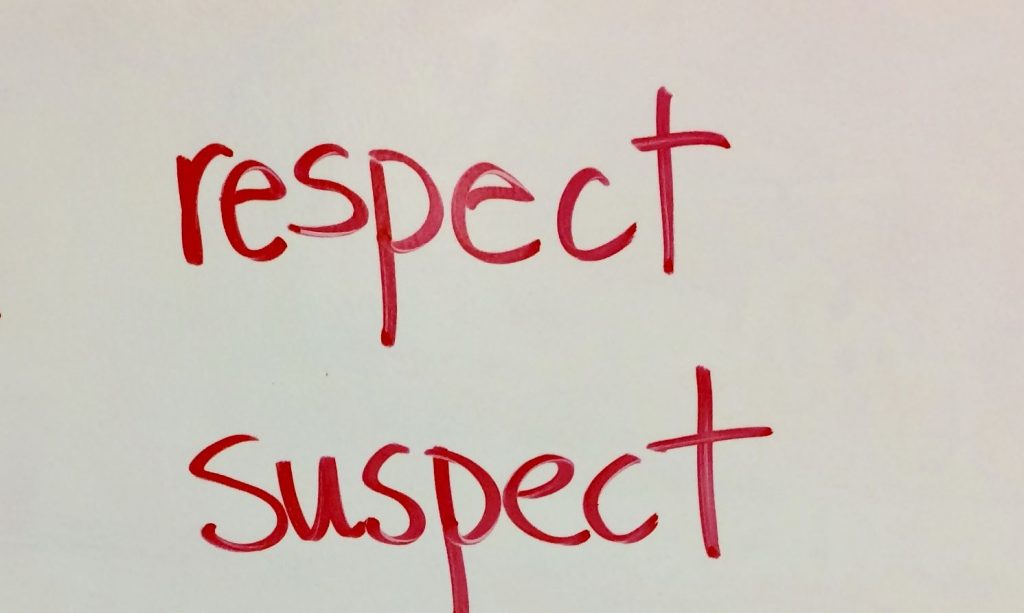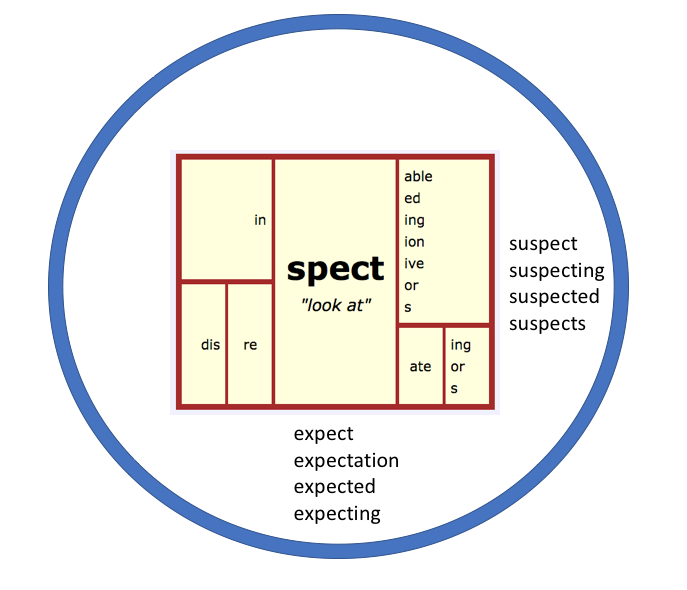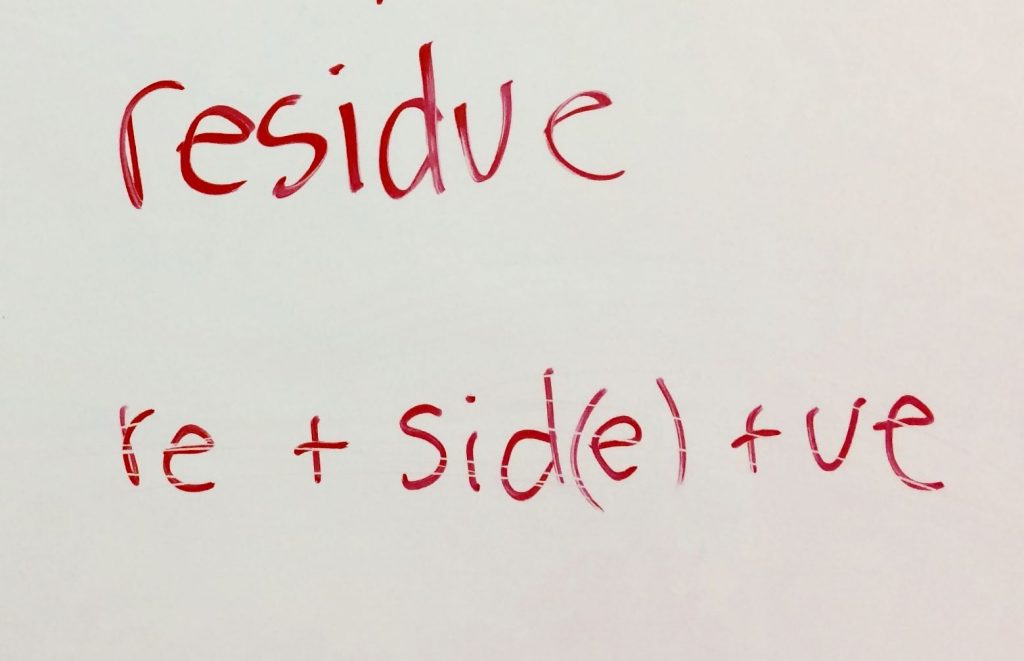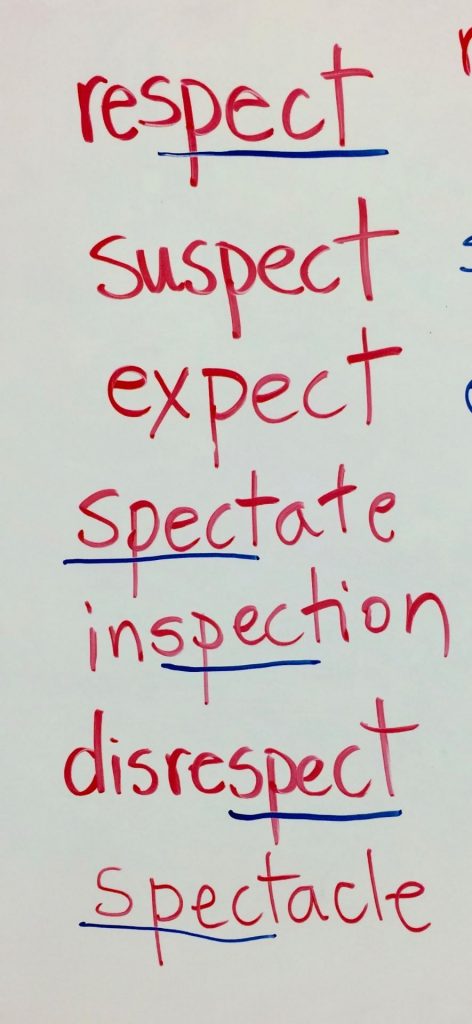This morning a student eagerly approached my desk. “Mrs. Steven? I have a question. This weekend I was reading a book and came across the words <respect> and <suspect>. I started wondering about them. I’m pretty sure that <sus> is a prefix. I remember seeing it during one of my word investigations. So that left me thinking that maybe the base in that word would be <pect>. But then, if these two words share a base, and I think they do, that would mean that the prefix in <respect> would be <res>, and I’m not so sure about that.”
As you can imagine, I can think of no better way to start a day! I thanked her for sharing her thinking about this situation, and promised that we would get the class to help us think further about this after they returned from the gym. We began by writing the two words on the board. Then I let Lauren explain her thinking about these words, and where she was stuck. 
***When a question like this is raised, the air seems to change in our room. The looks on faces indicate that thinking is going on. No one is doodling or even futzing with desk things! Heads are lifted and are facing the board. This is the look of engagement. Each brain buzzing, considering what has been proposed. A hand went up. “I agree that <sus-> is a prefix. Our group was looking at <sub-> and that was a variation.” Another student jumped in, “Oh, right! An assimilated prefix!” I asked, “What words can we think of that have an <sus-> prefix?” In addition to suspect, the students thought of suspend, suspension, and suspicion. We noted that the element following the <sus-> prefix began with a <p> in each of these examples. That is not always the case. If we had used Word Searcher to find more, we would also have found sustain, susceptible, and resuscitate. We thought about this word and the idea that <sus-> was assimilated from <sub->. We tried to pair up the <sub-> with the <pect> that followed. We talked about how <b> and <p> are formed using our lips and how difficult it is to pronounce them both in this context. We all agreed that THAT didn’t work. It makes sense that the <sub-> takes on an <sus-> form when the next element in a word begins with <p>. So now we had established that <sus-> was a proven prefix. We turned our attention back to the two words on the board. What next? Someone asked, “Maybe <res>is a prefix. I’m thinking of the word <residue>. ” I wrote it on the board, and almost instantly someone said, “But couldn’t the word sum for that be <re + sid(e) + ue>?”
At this point I shared that a few years ago I had a student who investigated the word <president>. He found out that the word sum was <pre + sid(e) + ent>. The base <side> had a denotation of “sitting”. A president is someone who sits before the people being represented. (I wish you could have heard the swoosh of “Ohhh” ‘s that slid across the room!) The student who had offered the word sum for <residue> then said, “And residue is something that just sits there! It gets left behind and just sits there!” There were smiles and nods all around. Now I posed the question, “What do you think is going on in the word <respect>?” The first student to respond said, “I think there is an <re-> prefix and an <spect> base. After all, I can think of speculate and inspection.” Someone else called out, “Expect.” (Perfect. I wrote it below suspect and hoped it would inspire some thinking. If not, I would point it out myself. But I was in no rush. ) “Great next step I said. Can anyone else think of words that might be sharing this base?” “What about spectacles? In Peter Pan, Smee wore spectacles!” (We are 16 pages away from finishing this book. Look for a future post about the rich conversations we have had about the many words we have encountered and thoroughly enjoyed!) A voice from the back of the room said, “Doesn’t <spect> have something to do with looking? If you inspect something, you are looking at it. If you wear spectacles, they help you see better. When you respect someone, it is like you are looking at them, really looking at them, and seeing something cool that you didn’t see before.” “Yes! Yes, it does.” I replied. Think also of a spectator. That is a person who has come to watch something.” The next thing I did was to underline the <spect> base we saw in the list we had accumulated. The only two words that didn’t seem to fit that were suspect and expect. “Hmmm. Who has
some thoughts about these two?”
Then from the back row someone said, “When we say the word <expect> there is already a /s/ as part of the pronunciation of <x>.” “You’re right! Everyone say the word <expect> and feel the /s/ that is part of the pronunciation of <x>. That’s some great thinking, Amelia! Perhaps the initial <s> on the base <spect> elided with the /ks/ when this prefix and base joined. So one hypothesis that might explain why the base element in <expect> does not include the initial <s> would be that when the prefix <ex-> joined with the base <spect>, the initial <s> on the base was elided. That means that the /s/ that was part of the /ks/ phoneme and the /s/ that was part of the <spect> base element became one. They were not both needed.” I continued, “Would this same hypothesis work for what is happening with <suspect>? What do you think?” “Well, yes. The /s/ at the end of <sus-> is pretty much like the /s/ in the /ks/.” ***Can you imagine how glorious it is to be able to have a discussion like this with 11 year old students? Eight months of learning about our English language has brought us to this point. I yearn for more time. They know enough to think like scholars and ask questions like scholars. They notice things about words that help them understand its origins, its structure, and its phonology. Now that we have a hypothesis, we need to do some research. We checked at Etymonline.
expect (v.)
suspect (adj.)
early 14c., “suspected of wrongdoing, under suspicion;” mid-14c., “regarded with mistrust, liable to arouse suspicion,” from Old French suspect (14c.), from Latin suspectus “suspected, regarded with suspicion or mistrust,” past participle of suspicere “look up at, look upward,” figuratively “look up to, admire, respect;” also “look at secretly, look askance at,” hence, figuratively, “mistrust, regard with suspicion,” from assimilated form of sub “up to” (see sub-) + specere “to look at” (from PIE root *spek- “to observe”). The notion behind the word is “look at secretly,” hence, “look at distrustfully.”
Again we noted that the sense and meaning of this word hasn’t changed much since the 14th century. We noticed that this word was used in Old French, but that didn’t affect its spelling. (We have come across situations in which it did.) Continuing on in the entry we saw that this word is from Latin suspectus which was the past participle of suspicere. Once again the students noticed that both of these had Latin verb suffixes. It made sense that suspicere would be the infinitive and suspectus would be the past participle. That would mean that those two principle parts of this same Latin verb would come into English as the twin bases <suspic(e)> and <suspect>!
Someone said, “If we add an <-ion> suffix to the base <suspic(e)>, we’ll have the word <suspicion>!” “Right. I am so impressed with how you recognize what to do with the information you are finding!” As we kept reading, we thought it interesting that the infinitive form <suspicere> was used to mean “look up to, admire, respect”, yet also “look at secretly, mistrust.” Those are opposite meanings! Even though it had those two senses at one time, today <suspic(e)> is used solely (I couldn’t find evidence to prove otherwise) to express a sense of mistrust or suspicion. Over time, the sense of “admire, respect” became less and less associated with this word. The next thing we noticed was the identification of the prefix <sus-> as an assimilated form of <sub->. It’s always great to find evidence to support what we were thinking earlier!
As we finished reading this entry, I again asked, “Did we find any evidence to support our hypothesis?” Well, yes and no. We just found out that <suspect> is one of a pair of twin bases. That means we can look at it as a base element that needs no further analyzing. On the other hand, the entry at Etymonline does confirm that <sus-> is the assimilated form of <sub-> and that the modern base element is derived from Latin specere. That is great information, but might leave a person with more questions than clarity. We saw that <expect> had a spelling in Latin that included the <s> after the <x> (exspectare). We found out a lot of interesting things, but nothing that verified whether that initial <s> on the modern base had elided when the prefix and base were joined. ***The only time this becomes a question is when we think about the words synchronically and are trying to write a word sum or create a word matrix. One thing we can say for certain is that we wouldn’t include expect or suspect on the same matrix as respect, spectator, inspect, or speculate. I am not even sure I would create a matrix to represent the elements in <expect>. I would prefer to write a word sum like this: <ex- + (s)pect –> expect> and then explain why I included the (s). Others might represent this differently, but the most important thing I want my students to understand here is that respect, suspect, and expect all come from the same Latin verb. There is another base element <pect> from Latin pectus with a denotation that is quite different. We see it in pectorals and expectorate. It has to do with the breast. Pectorals were originally the breastplates men wore. Now they refer to the chest muscles. To expectorate is to spit or to expel from the chest. This base element might look like the one we see in <expect>, but it obviously isn’t. Let’s not get them confused. Here is one idea for representing these words in
a single visual:

All the words within the circle derive from the same Latin verb. The fact that expect and suspect do not share the same spelling as the base of respect means they would not be on the same matrix as respect. This matrix does not include all the possible elements it could, nor do the lists outside the matrix but within the circle. I just wanted to illustrate one possible way to represent words in a situation like this. Just so you know, I’m still thinking about all this. I’m thinking about what’s happening with inspire and expire, with exist, and exert. I don’t feel like I have to have a ready answer for my students. We just owe it to ourselves to investigate as we can and then think about what our current understanding is. From there we identify what it is we still have questions about. And then we move forward keeping our ears open for some piece of evidence or some bit of research that reveals a bit more and deepens our understanding. So our hypothesis still stands and awaits evidence. My students have no problem with not finding a clear and defining answer to Lauren’s question. All an answer does is end that line of questioning, and what fun is that?


